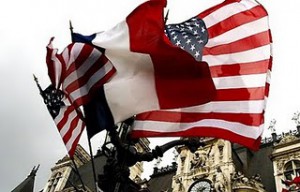I Am a Francophile and I Am Disappointed

I adore France and all things French. My father grew up in France, I’m one-quarter French, and my siblings and I are close to many of my French second cousins. Despite the geographical distance, we do our best to attend their weddings and memorials, and they ours. My home is filled with French art, French textiles, French cookbooks, and, of course, French wine. I have a set of bookends that I gave to my father when I was nine: one end is the bust of Napoleon (who was kind of a rock star to me at the time), the other is the bust of Josephine.
I’m also pretty sure I inherited my agnostic nature from the French side of the family—most of whom have been nonreligious going back to my great grandmother.
Several days ago, as I enjoyed my French roast coffee made in my French press, I was stunned to hear a story on National Public Radio about police in Nice, France, (a beautiful seaside town I’ve visited twice) insisting, by law, that a Muslim woman remove some of her clothing in compliance with the city’s “burkini ban.”
France has certainly been slammed by terrorist events in recent history, and I can only imagine how traumatized and fearful the French populace must be. Terror attacks have struck them in intimate, innocent surroundings, in concert halls and restaurants, in small towns and sports stadiums. These events have taken the lives of ordinary people doing ordinary things, like a family celebrating Bastille Day or a priest serving mass.
Listening to a Muslim journalist interview Rudy Salles, the deputy mayor of Nice, on the BBC, I was struck by the absolute senselessness of Salles’s rationalization: “It is not the habit and the custom of the Muslims in Nice to wear [clothes] like this on the beach.” Basically, a style of dress has been deemed illegal because it’s out-of-the-ordinary and is being practiced by a person who happens to be a member of a religious faith and so happens to share some religious practices with a terrorist organization that misuses and misconstrues religious doctrine to justify war.
How many times do we have to scapegoat entire groups of human beings because of the behavior of a few? Freedom is about choice. Liberty is about not having another’s authority imposed over one’s way of life, behavior, or political views.
I will not scapegoat the French people for the ignorant and reactionary behavior of some members of French lawmaking and enforcement. I will tell my friends and my family, both French and American, how terribly wrong I believe this persecution is. A burkini is not a weapon. It’s not an insult or a slight. It is simply a personal choice based on one’s own beliefs and desires and has absolutely no inherent moral value—no more than pants on women in the late 1800s, long hair on men in the 1960s, or bikinis on women in the United States in the ’50s.
As a Francophile I’m embarrassed by the actions of some French officials, just as I’m embarrassed as an American by the political discourse surrounding the current presidential campaign.
As a humanist I’m grateful that I don’t need to justify my style of dress, my hairstyle, my sexual preference or identity, my gender, or my preference for four-legged creatures over two-legged ones.
While we Americans are still stuck with the unfortunate national motto, “In God We Trust,” the leaders in France mustn’t forget theirs: Liberté, égalité, fraternité.
